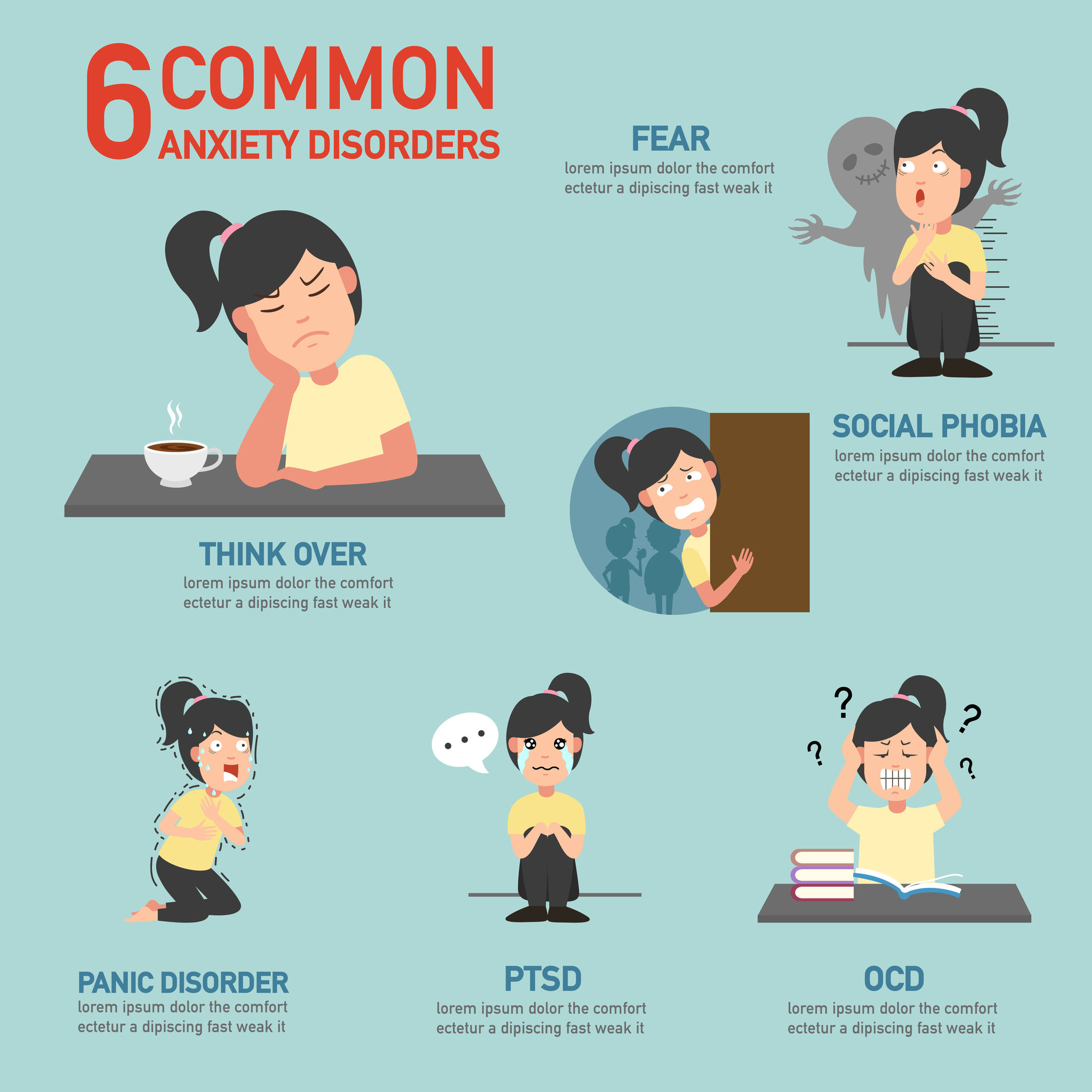Online support accessible today with a licensed therapist for anxiety
Wiki Article
Exploring Different Techniques in Coaching for Anxiousness Disorder for Long Lasting Adjustment
When dealing with anxiety disorders, it's important to explore a variety of therapy techniques. Each technique uses one-of-a-kind understandings and tools to aid you handle your signs successfully. You may discover that combining techniques can yield the most effective outcomes. However, understanding the nuances of these approaches is vital to promoting long lasting change. What if the ideal combination could release a new level of psychological health for you?Recognizing Stress And Anxiety Problems: A Brief Review
Stress and anxiety disorders, which affect countless individuals worldwide, can significantly impact every day life. You could experience overwhelming sensations of anxiety or stress that seem unmanageable. These sensations can lead to physical signs and symptoms like a racing heart, sweating, and even dizziness. Typical kinds of stress and anxiety problems consist of generalized stress and anxiety disorder, panic attack, and social anxiety disorder. Each has unique signs, but they all share a propensity to disrupt your regular and relationships.Understanding the source of your anxiousness is important. It might stem from genetics, mind chemistry, or life experiences. Recognizing your triggers can aid you handle your feedbacks much better. It's essential to bear in mind that you're not alone in this battle. Lots of people encounter similar challenges, and seeking aid is a solid action toward sensation better. By learning regarding anxiety disorders, you're currently on the course to understanding and managing your condition better.Cognitive-Behavioral Therapy: Testing Unfavorable Thought Patterns
In Cognitive-Behavioral Treatment, you'll begin by recognizing the negative thought causes that contribute to your anxiousness. You'll work on replacing them with more positive choices as soon as you recognize these thoughts. With each other, you'll develop efficient coping strategies to aid handle your stress and anxiety in everyday scenarios.Identifying Unfavorable Thought Triggers

Identifying the specific triggers behind your unfavorable thoughts can be necessary in taking care of anxiousness when you come across minutes of distress. Begin by taking note of scenarios that prompt feelings of fear or fear. Is it a congested area, a forthcoming due date, or a discussion with particular people? Write down these instances in a journal. This will certainly assist you determine patterns in your reasoning. Notification physical experiences that accompany your unfavorable ideas, like an auto racing heart or tightness in your breast. By identifying these triggers, you obtain understanding into what's fueling your anxiousness. Recognizing these connections is the very first action in challenging those ideas and inevitably restoring control over your psychological reactions.
Changing Ideas With Positives
Testing unfavorable idea patterns is an important action in changing your attitude and reducing stress and anxiety. You might commonly find on your own entraped in cycles of insecurity or devastating thinking. Instead of letting these ideas determine your sensations, technique changing them with sensible alternatives or favorable affirmations. When you think, "I can't handle this," shift it to, "I can take care of obstacles one action at a time." This easy modification can considerably impact your mood. Consistently recognizing and responding to these negative ideas helps produce a healthier interior discussion. Remember, it takes time and initiative, but constantly practicing this technique can result in long lasting change, empowering you to face anxiety with renewed self-confidence and resilience.Structure Coping Strategies Together
Replacing unfavorable thoughts is just the beginning of taking care of anxiety successfully. To produce long lasting change, you need to develop coping techniques that equip you. Cognitive-Behavioral Therapy (CBT) helps you identify and challenge those unhelpful idea patterns. With each other, you and your counselor can discover how these thoughts effect your sensations and behaviors.Start by developing practical methods, like journaling or mindfulness workouts, that enable you to confront anxiety head-on. When you face your anxieties slowly, you'll learn to respond differently.
Mindfulness and Acceptance-Based Approaches: Cultivating Present-Moment Awareness
As you navigate the intricacies of anxiousness, integrating mindfulness and acceptance-based approaches can considerably boost your ability to cultivate present-moment awareness. By concentrating on the below and currently, you'll find that you can observe your thoughts and sensations without judgment (Counseling services for anxiety). This practice assists you recognize your stress and anxiety without really feeling bewildered by it.Engaging in mindfulness exercises, such as deep breathing, body scans, or directed reflections, enables you to ground on your own in your existing experience. Acceptance-based strategies encourage you to welcome your emotions rather than fight versus them. When you approve your feelings, they shed their power over you.Incorporating these practices right into your everyday routine can transform how you react to stress and anxiety. You'll establish strength and learn to browse stressful circumstances with better ease. Ultimately, cultivating present-moment recognition lays the foundation for long lasting modification, encouraging you to lead an extra meeting lifeDirect Exposure Therapy: Challenging Concerns Slowly
Direct exposure treatment assists you challenge your anxieties in a steady way, making it less overwhelming. You'll discover methods to face anxiety-provoking situations detailed, while also constructing coping approaches to handle your reactions. This technique encourages you to take control and decrease stress and anxiety gradually.Progressive Direct Exposure Techniques

When facing anxiousness, slowly confronting your fears can be an effective means to restore control. This technique, referred to as gradual exposure, includes gradually subjecting yourself to the scenarios or objects that activate your anxiety. Beginning with less daunting circumstances and progressively function your way as much as more tough ones. If you're scared of public speaking, you might begin by speaking in front of a mirror, after that progress to sharing thoughts with a buddy, and at some point attend to a tiny group. Each action assists desensitize you to the fear, constructing your self-confidence with time. Keep in mind, it's important to pace on your own and commemorate little victories as you move through this process, enhancing your ability to handle anxiety effectively.
Structure Coping Techniques
Building reliable coping approaches is crucial for taking care of anxiousness, especially as you confront your fears gradually - Counseling services for anxiety. One effective technique is exposure therapy, where you start by encountering your fears in a regulated fashion. Start with much less frightening circumstances and slowly function your means as much as more tough circumstances. This progressive direct exposure assists desensitize you to stress and anxiety activates, making them much less overwhelming.Incorporate leisure strategies, such as deep breathing or mindfulness, to relax your mind during direct exposure. Track your development, commemorating tiny success in the process to boost your confidence. Keep in mind, it's alright to take your time; the goal isn't excellence however constant improvement. By developing these techniques, you'll equip yourself to browse anxiety and welcome life more fullyPsychodynamic Therapy: Revealing Origin of Anxiousness
Psychodynamic therapy explores the subconscious mind, exposing his explanation the origin triggers of your anxiety. By examining your thoughts, sensations, and previous experiences, this technique assists you reveal underlying conflicts and unresolved issues that may add to your current look at this now anxiousness. You'll collaborate with a specialist to check out childhood years experiences, relationships, and psychological patterns that shape your responses today.As you gain insight right into these much deeper layers of your psyche, you'll begin to identify just how previous occasions affect your present habits. This understanding can lead to catharsis, enabling you to refine emotions you may have suppressed.Through the restorative partnership, you can additionally determine defense mechanisms that may have established gradually, providing a clearer course to alter. Ultimately, psychodynamic treatment outfits you with the tools to address your anxiety at its core, promoting enduring makeover in your emotional wellness.Integrative and Holistic Strategies: Integrating Techniques for Greater Effectiveness
Integrating various therapeutic strategies can improve your journey towards taking care of anxiety better. By combining components from cognitive-behavioral treatment, mindfulness methods, and all natural approaches, you can produce a customized approach that addresses your one-of-a-kind requirements. As an example, you might make use of cognitive-behavioral techniques to challenge unfavorable thought patterns while including mindfulness workouts to ground yourself in the present moment.Additionally, checking out all natural techniques such as yoga exercise or meditation can promote leisure and reduce stress and anxiety signs and symptoms. This blend enables you to establish better self-awareness and resilience.Experimenting with these varied methods can aid you uncover what resonates most with you. Keep in mind, it's concerning locating a synergy that functions, instead of adhering to a single strategy. This integrative method not just supplies immediate alleviation but additionally cultivates long-term skills for handling stress and investigate this site anxiety, equipping you to recover control over your life.The Duty of Support Equipments: Structure Durability With Connection
While it could appear that handling stress and anxiety is a solitary journey, having a strong support system can play an important duty in your resilience. Bordering on your own with empathetic close friends, family members, or support groups creates a secure room where you can freely share your experiences and sensations. When you get in touch with others, you advise yourself that you're not the only one in this struggle.These relationships supply support and can offer sensible coping methods that have actually benefited others. It's additionally a possibility to gain point of view; buddies can aid you see situations in different ways, minimizing feelings of isolation.Moreover, psychological assistance cultivates a feeling of belonging, which can significantly relieve anxiety signs. By leaning on your support group, you can construct resilience and deal with difficulties better. Remember, connecting for assistance suggests toughness, and it can make all the difference in your journey toward handling stress and anxiety.Regularly Asked Inquiries
What Are the Common Symptoms of Anxiety Disorders?
You may experience restlessness, exhaustion, difficulty focusing, irritability, muscular tissue tension, and sleep disturbances. Physical symptoms can include rapid heartbeat, sweating, and trembling. Recognizing these signs early can help you seek suitable assistance and therapy.How Much Time Does Therapy Typically Last for Anxiousness Problems?
Treatment for anxiousness conditions normally lasts anywhere from a couple of weeks to a number of months. It truly depends upon your individual requirements, development, and the techniques your therapist makes use of to aid you manage your anxiety efficiently.Can Medicine Be Used Alongside Treatment for Anxiousness?
Yes, medicine can absolutely be utilized alongside treatment for anxiousness. Integrating both methods frequently improves treatment efficiency, helping you handle signs while exploring underlying concerns with counseling (Counseling services for anxiety). Constantly consult your doctor for customized suggestionsExist Self-Help Techniques for Taking Care Of Anxiousness?
Yes, there are several self-help strategies for taking care of stress and anxiety. You can exercise mindfulness, take part in regular workout, keep a balanced diet regimen, develop a routine, and use deep breathing strategies to help in reducing anxiousness signs properly.How Do I Know if I Required Specialist Help for Anxiety?

Report this wiki page